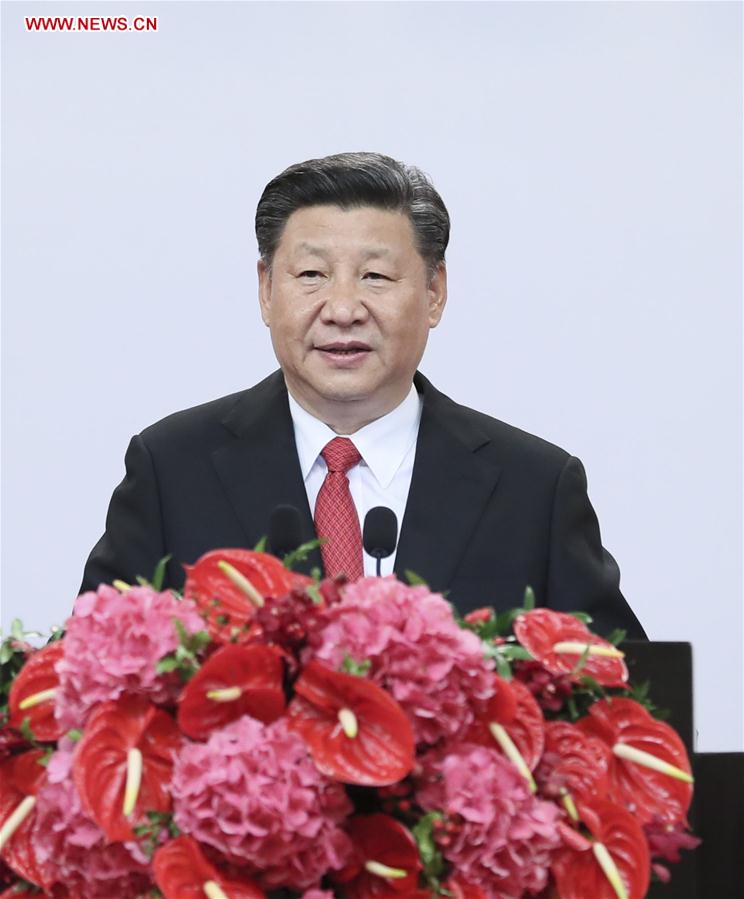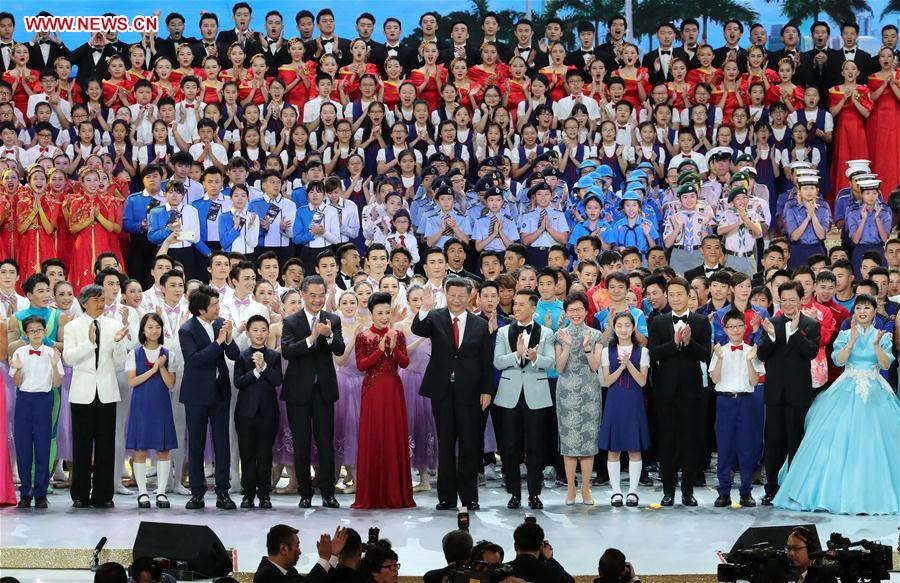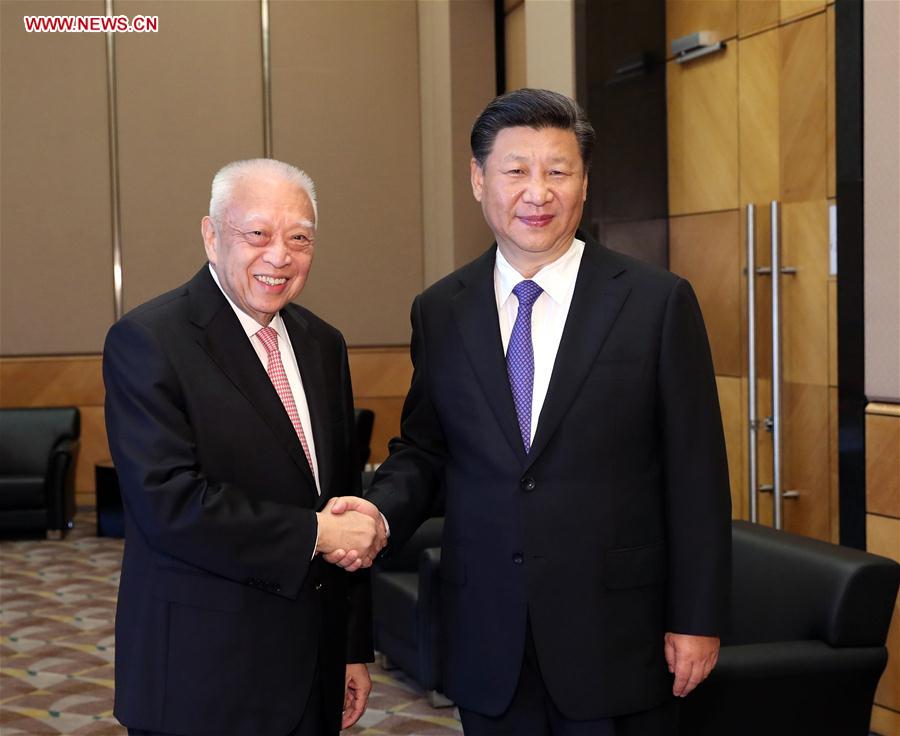Xi pledges firm commitment to ‘one country, two systems’
|
|
|
Chinese President Xi Jinping speaks at a welcome dinner hosted by the government of the Hong Kong Special Administrative Region, in Hong Kong, south China, June 30, 2017. (Xinhua/Lan Hongguang) |
President Xi Jinping reiterated the central government’s firm commitment to “one country, two systems” on multiple occasions Friday, a day before the 20th anniversary of Hong Kong’s return to China.
“The road ahead may not be smooth, but our commitment to ‘one country, two systems’ remains unchanged, and our resolve remains firm and strong,” said Xi when addressing a welcome dinner hosted by the government of the Hong Kong Special Administrative Region (HKSAR).
The president compared the practice of “one country, two systems” in Hong Kong over the past two decades to the growth of a seedling, which has become strong and robust despite wind and rain and yielded many fruits.
Hailing “one country, two systems” a great pioneering initiative by China, Xi said its practice, featuring socialism in the main body of the country and capitalism in certain regions, is unprecedented in human political history.@ “It is a breakthrough those before us made through exploration and with extraordinary courage. We the succeeding generation should practice and develop ‘one country, two systems’ with firm resolve,” Xi said.
“We should have full confidence in ourselves, in Hong Kong and in our country,” the president said, calling for persistent and unrelenting efforts to achieve even greater success in the practice of “one country, two systems” in Hong Kong.
Riding in an open-top camouflage jeep, Xi, also general secretary of the Central Committee of the Communist Party of China and chairman of the Central Military Commission, inspected the Chinese People’s Liberation Army Garrison in the HKSAR at Shek Kong barracks Friday.
Xi told the troops to firm up the responsibility for and commitment to safeguarding “one country, two systems.”
“The garrison is an important embodiment of national sovereignty, an important force to safeguard ‘one country, two systems,’ and an important cornerstone of Hong Kong’s prosperity and stability,” Xi said.
He urged the garrison to make efforts to enhance “combat readiness” so as to fulfill its role as a powerful stabilizing force.
The president’s tight schedule Friday also included whirlwind meetings with local dignitaries, the HKSAR’s first chief executive Tung Chee-hwa, the Macao Special Administrative Region’s chief executive Chui Sai On, and central government officials based in Hong Kong and executives of Hong Kong branches of mainland enterprises and institutions.
During the meeting with a group of dignitaries from all walks of life of Hong Kong, Xi said the central government stands firm on the “one country, two systems” principle.
For Hong Kong, the focus is not whether the principle will change or not, but how to implement it comprehensively and accurately, Xi stressed.
Since Hong Kong’s return to the motherland two decades ago, the successful practice of the “one country, two systems” in Hong Kong has won global recognition, Xi said.
New situations and new problems emerging in practice should be treated in a correct and reasonable manner, Xi said, adding ways must be found to solve the problems.
When difficulties are overcome and problems solved, progress is made in the practice of “one country, two systems,” he said.
INSTITUTIONAL ADVANTAGE
Addressing the dinner held in honor of him Friday, the president called on Hong Kong to leverage its institutional advantage of “one country, two systems” to create new growth drivers and new space for development.
The practice of “one country, two systems” has given Hong Kong an “institutional advantage,” enabling it both to share in the mainland’s vast market and development opportunities and often serve as a testing ground for the country’s new opening-up initiatives, Xi said.
By building on and leveraging its strengths, Hong Kong will surely be able to seize opportunities presented by economic globalization and regional cooperation to promote innovative local business start-ups, and develop new growth drivers, he said.
“The motherland has given and will always give a strong backing to Hong Kong,” the president said.
Hong Kong has leveraged the combined advantages of “one country” and “two systems,” continuously expanded its functions, and has played the role of “super-connector” between the mainland and the world in the past 20 years, said outgoing HKSAR Chief Executive Leung Chun-ying in his welcoming remarks at the banquet.
The continuous development of the country will give new and huge impetus to Hong Kong’s social and economic development, and provide the young generation with a more diverse, larger and more colorful stage of life, he noted.
Enjoying a light moment on the eve of the return anniversary, the president attended a grand gala marking the event at the waterfront Hong Kong Convention and Exhibition Center Friday night.
The show culminated when Xi stepped onto the stage and sang in chorus the song “Ode to the Motherland” with the performers and the audience.
Xi arrived here Thursday to attend celebrations for Hong Kong’s 20th return anniversary and the inauguration of the HKSAR’s fifth-term government. Inspection of the HKSAR is also on the schedule for his three-day stay.


